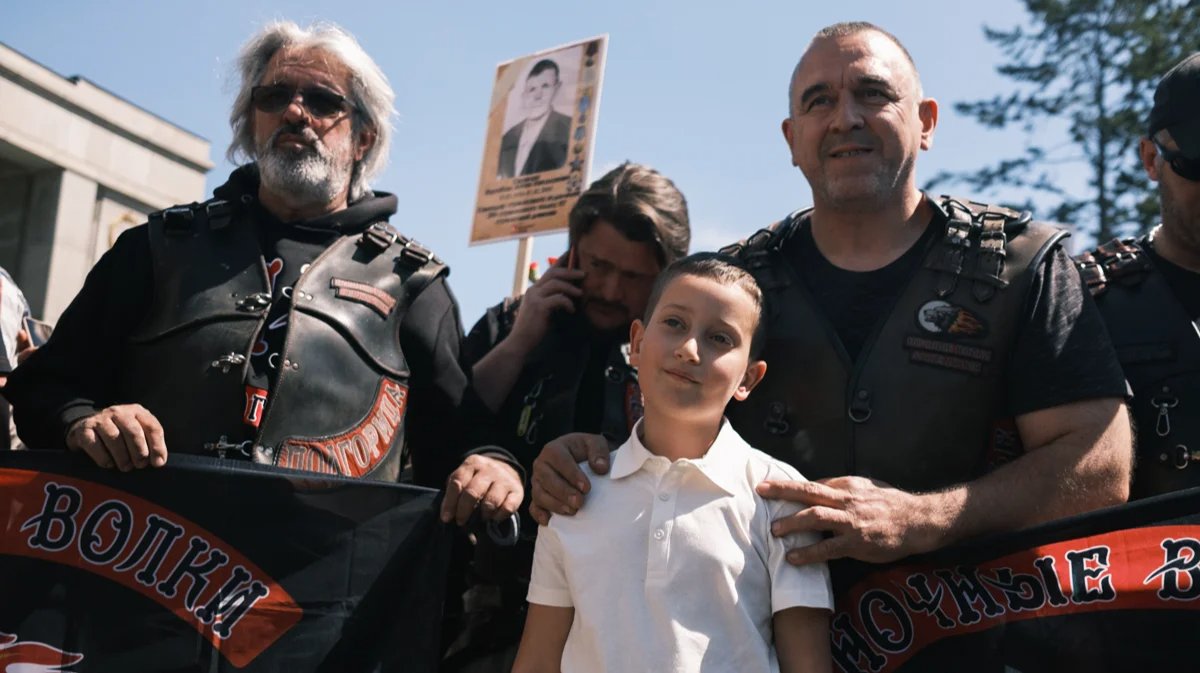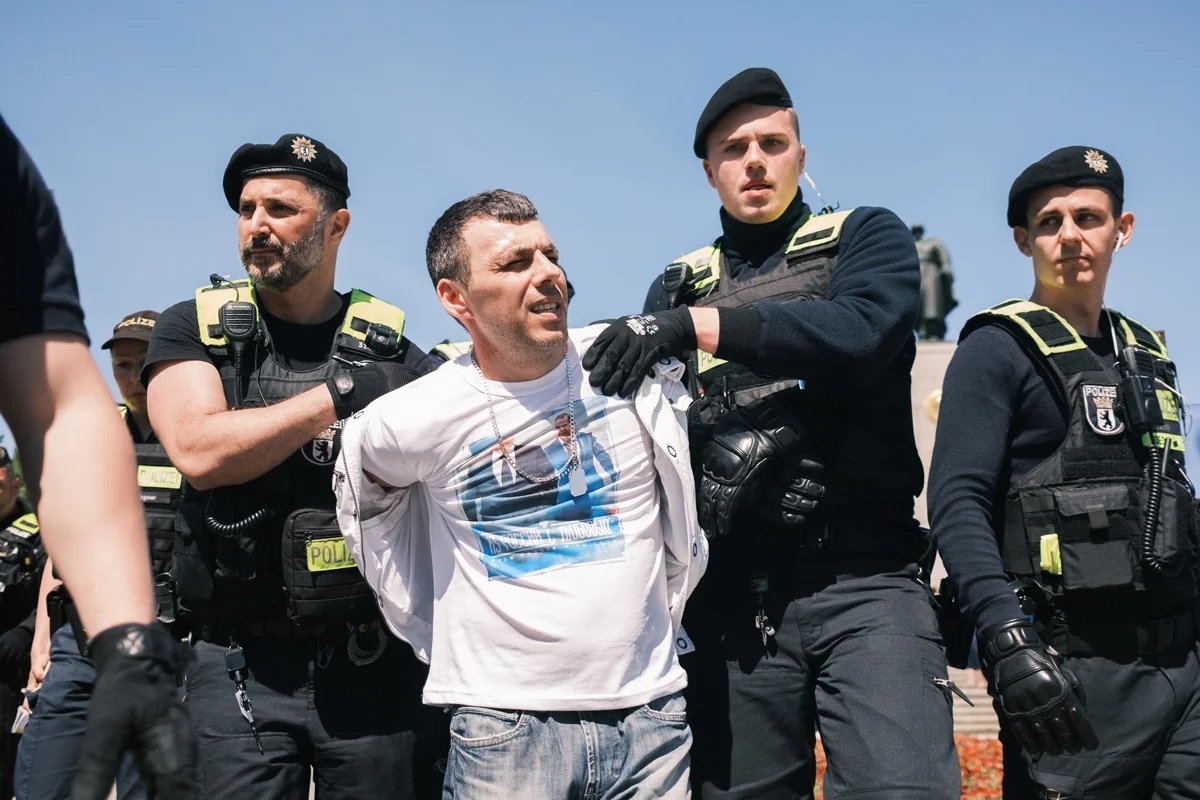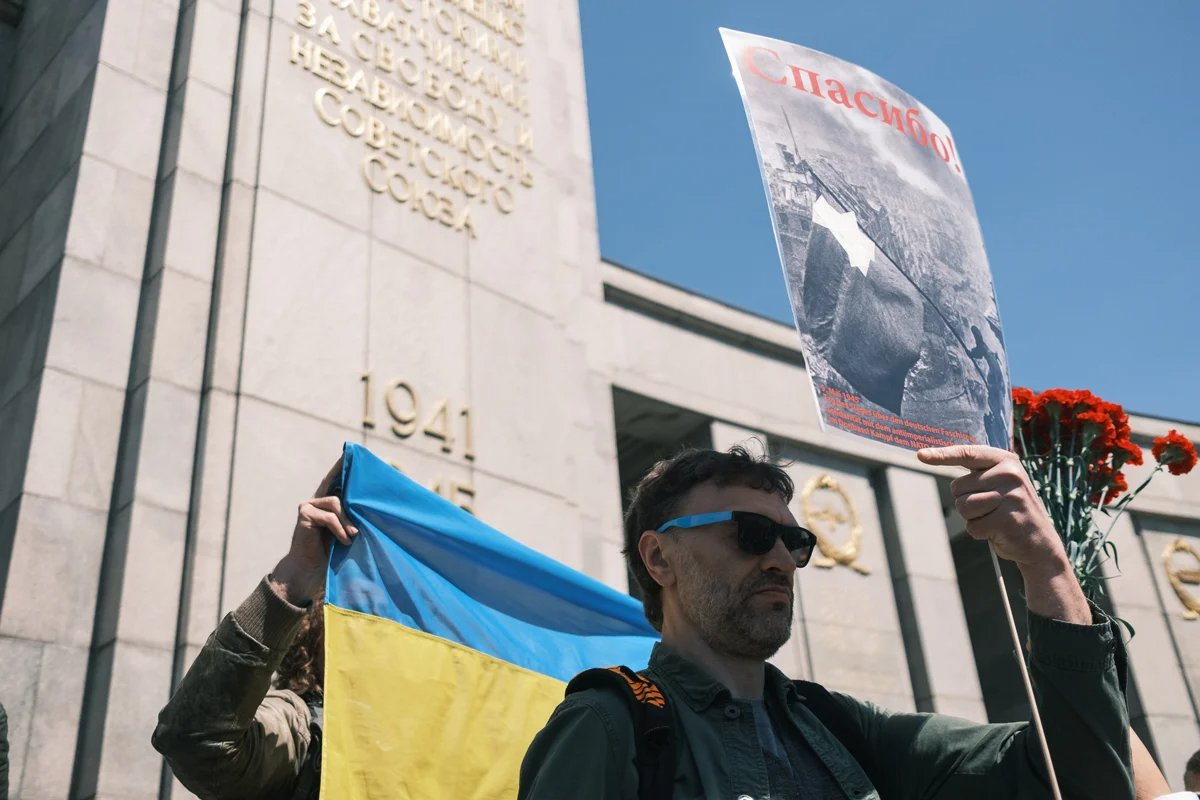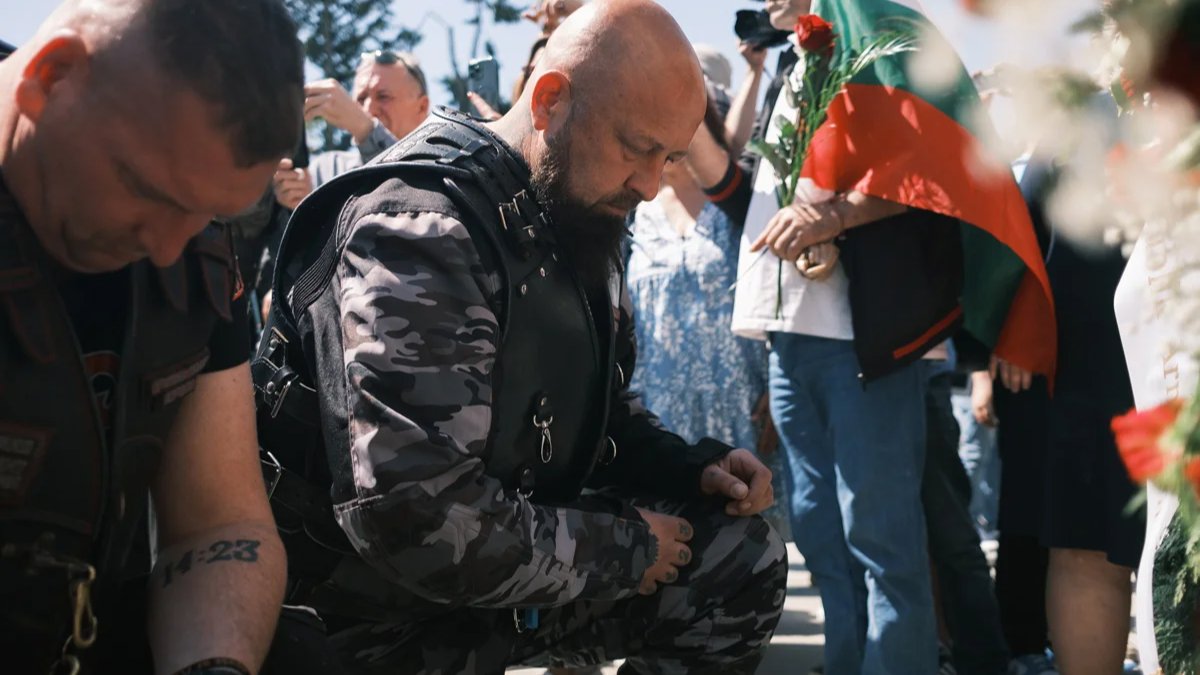Each year on 9 May, a group of pro-Putin bikers called the Night Wolves gathers in Berlin to take part in the annual Moscow-Berlin Victory Day celebration. But since Russia’s full-scale invasion of Ukraine, these gatherings — and the war memorials where they take place — have taken on far greater political significance.
This year brought new difficulties for the Night Wolves as German police banned the display of both Soviet and Russian national symbols at the country’s victory memorials. Sofia Verba followed the Night Wolves on their route through Berlin and reported on what she witnessed.
Scenes from Tiergarten
This year’s Victory Day gathering was met with a heavy police presence. The German authorities, anticipating the Night Wolves’ arrival, stationed police vans near Tiergarten, Berlin’s largest and most famous park, and increased the number of officers on duty around the war memorial.
The Night Wolves arrived in bandanas and matching black leather jackets, emblazoned with the words “Roads of victory”. They approached the war memorial together, knelt to place wreaths, and crossed themselves, while a crowd that had gathered shouted words of support.

Visitors to Tiergarten take photos with the Night Wolves. Photo. Daniil Mashtakov
Later, onlookers were treated to scenes that included police dragging a man in a pro-Putin T-shirt away as he swore at them loudly, while the crowd signalled their support to him in Russian, as well as shouting “for shame!” to the police officers in German.
Another protester was detained for attempting to snatch a Ukrainian flag from a bystander, and a young boy shouted a pro-Russian slogan at the police as they detained various members of the Night Wolves who were making trouble.
Older members of the Night Wolves recalled how the celebration has changed over the last few years. One member, Zhenya, looked the part in his biker sunglasses and leather jacket, while his bike, parked nearby, had a glowing skull on it. “I used to live in Almaty and I got married there. I moved to Germany in 2005 with my wife, two children and mother-in-law because my wife is Russian-German. I didn’t want to spend my life in Kazakhstan and I didn’t want my children to do so either, because it’s a Muslim country.”
“This isn’t a provocation. I want to get through to people. Unlike in Russia, there is still freedom of speech here.”
He said that Victory Day used to be a “huge celebration” with lots of people “sitting and drinking beer”. Now, he said “everything is banned” and some bikers have even stopped attending the Berlin festivities altogether.
Other people, however, said that the increased police presence made them feel more comfortable attending the event. A Russian woman who left the country in 2022 came to the memorial with a small A5 anti-war poster held proudly aloft. “I don’t care what they say,” she said, as Night Wolves and other pro-Russia demonstrators gathered around her. “The police are protecting me and I’m safe. This isn’t a provocation. I want to get through to people. Unlike in Russia, there is still freedom of speech here.”

A man is detained by police for attempting to snatch a Ukrainian flag from a bystander. Photo: Daniil Mashtakov
A changing celebration
In Russia, 9 May was not a holiday until 1995. That year, the official speeches drew parallels between World War II and the First Chechen War raging at the time. Since then, Victory Day ceremonies have become both more diverse and more divisive across Europe. This year in Berlin, Russian flags were visible alongside Serbian, Kazakh, Soviet, Ukrainian, and Bulgarian ones. At noon on 9 May, separatists representing the Donetsk People’s Republic, the internationally unrecognised occupied territory of eastern Ukraine’s Donetsk region, gathered at the memorial as well.
The myriad political and national perspectives on display and growing tension at the various celebrations of the end of World War II have led the German authorities to monitor such ceremonies closely. In one tense instance this year, a pro-Ukrainian activist stood in front of the memorial holding a Ukrainian flag as pro-Russian supporters shouted insults at him.

Pro-Russian visitors at the memorial block an activist holding a Ukrainian flag in front of the memorial. Photo: Daniil Mashtakov
All national symbols and flags are banned from the Tiergarten memorial, and police search each visitor at the entrance to the site to enforce the ban.
An elderly man wearing a green military uniform and carrying a huge Soviet flag has a smile on his face despite not being allowed closer. “I am from Sofia, I learned Russian at school. I am with Russia until the end,” he explained. “They won’t let me in wearing a uniform or with a flag. Not since 2022.”
Many of the bikers also refused to comply with the rules and deliberately brought along pro-Russian memorabilia. The pro-Russian crowd becomes visibly angry when the German police confiscate items or detain those who ignore their warnings not to wave the Russian flag.
“Germany is now my home, the place I moved to … but it’s not my motherland. I can say for sure that my homeland no longer exists. My homeland was the Soviet Union, and now it isn’t there, so without it I’m rootless.”
The war in Ukraine has turned what once was a celebration of the Soviet Union’s victory over Nazi Germany and a commemoration of the lives lost during World War II into a “patriotic” spectacle aimed at promoting Kremlin loyalty. The significant police presence at this year’s celebration in Tiergarten is emblematic of just how divisive the once unifying holiday has become.
Zhenya perhaps encapsulates best the sense of loss that some in the diaspora feel and may go some way to explain the feeling of loyalty to Putin and Russia that to many others, in the diaspora or beyond, is incomprehensible.
“Kazakhstan is where I ended up living after the collapse of the Soviet Union. Germany is now my home, the place I moved to … but it’s not my motherland. I can say for sure that my homeland no longer exists. My homeland was the Soviet Union, and now it isn’t there, so without it I’m rootless.”

